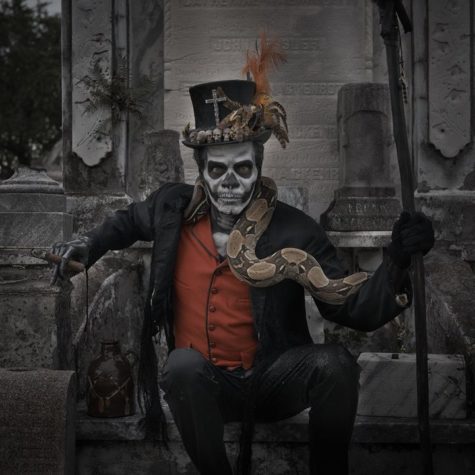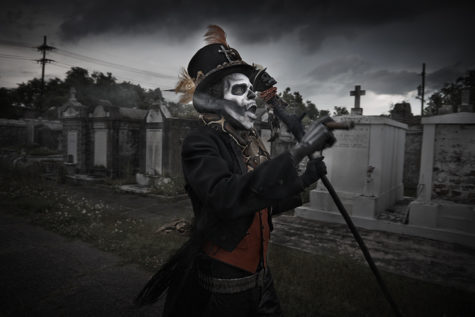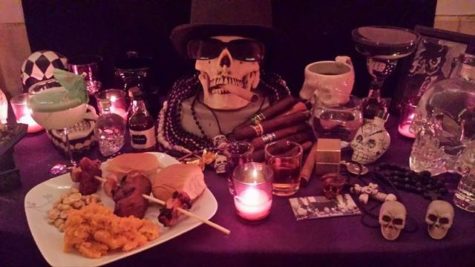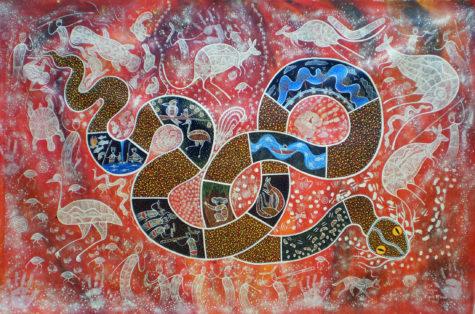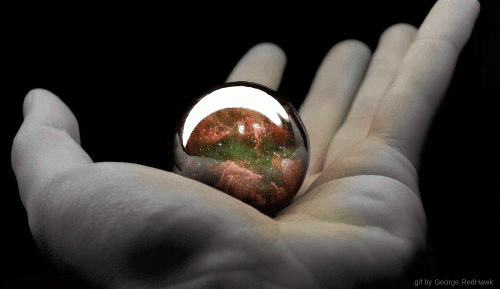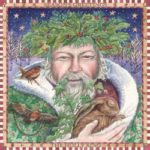Voodoo Deities
- Titles: Master of the Cemetery, Lord of the Dead
- Also known as: Bawon, Samedi, Bawon Sanmdi, Baron Saturday, Baron Sandi
- Colors: Black, also red and purple
- Day: Saturday
- Numbers: 3, 7, 21
- Classification: Lwa
- Consort: Madame Brigitte (Maman Brigitte)
- Venerated in: Haitian Vodou, Louisiana Voodoo, Folk Catholicism
- Feast: November 2
- Patronage: Death, tombs, gravestones, cemeteries, dead relatives, obscenities, healing, smoking, drinking, disruption, spirits
Baron Samedi is one of the loa of Haitian Vodou. He is the leader of the Barons and possibly the Gedes. He presides over a sprawling, confusing, complex clan of spirits. When people speak of the Baron, they tend to mean Baron Samedi. Baron Samedi literally means Baron Saturday, which may sound innocuous compared to Baron Cemetery, or Krininel, but Saturday was the one day when Christ was really truly dead, the day between the crucifixion on Friday and resurrection on Sunday. On Saturday, even Jesus must answer to the Baron, Lord of the Dead.
Baron Samedi is Grand Master of the Celestial Masonic Lodge of Vodou Spirits, a thirty-second degree initiated Mason. He is invoked to contact and communicate with the dead. He determines whether they can come visit or not. He may be petitioned to remove bothersome ghosts and invoked to ward off death.
He is noted for disruption, obscenity, debauchery, and having a particular fondness for tobacco and rum. Additionally, he is the loa of resurrection, and in the latter capacity he is often called upon for healing by those near or approaching death, as it is the only Baron who can accept an individual into the realm of the dead.
Baron Samedi spends most of his time in the invisible realm of vodou spirits. He is notorious for his outrageous behavior, swearing continuously and making filthy jokes to the other spirits. He is married to another powerful spirit known as Maman Brigitte, but often chases after mortal women. He loves smoking and drinking and is rarely seen without a cigar in his mouth or a glass of rum in his bony fingers.
Baron Samedi can usually be found at the crossroads between the worlds of the living and the dead. When someone dies, he digs their grave and greets their soul after they have been buried, leading them to the underworld.
He is a powerful healer and is especially sympathetic to terminally ill children. Baron Samedi rules the cemetery: no one can die until he gives permission for their grave to be dug. Baron Samedi is lewd, obscene, and vulgar, but he can be just and kind. He prefers that children live full lives before joining him in the cemetery.
Baron Samedi is the crossroads where sex and death meet. Spirit of the undying life-force, he may be petitioned for fertility. He is the guardian of ancestral knowledge and the link to your ancestral spirits. If one lens keeps popping out of your dark glasses, the Baron may be seeking your attention or offering his patronage.
Baron Samedi is syncretized to Jesus Christ as they share the symbol of the cross. It is possible that Baron Samedi’s associations with the cross may pre-date christianity. In Congolese cosmology, the cross is the symbol of the life cycle: death – birth – rebirth. He may also be syncretized to Saint Expedite, and with Saint Martin de Porres.
- Note:
Syncretized means to attempt to unite and harmonize especially without critical examination or logical unity.
Manifestations:
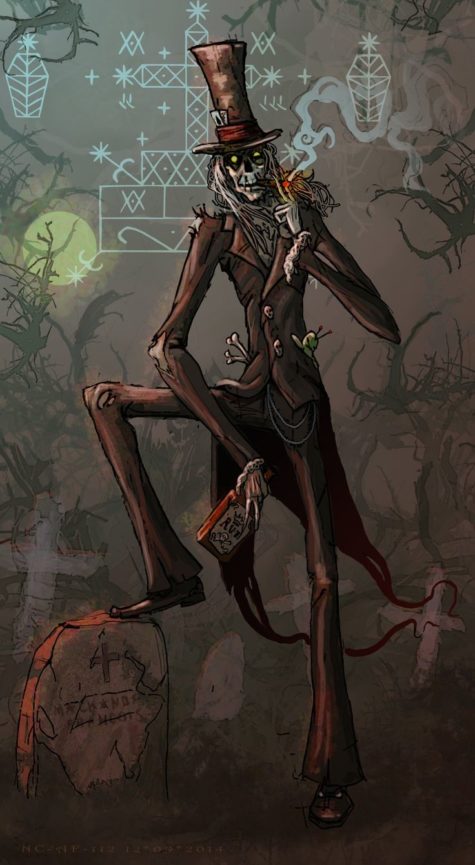 Baron Samedi manifests as an older, dark-skinned man in formal attire, dressed completely in black. He wears a black top hat, black suit, and may be smoking one of his beloved cigars. He wears impenetrable black sunglasses.
Baron Samedi manifests as an older, dark-skinned man in formal attire, dressed completely in black. He wears a black top hat, black suit, and may be smoking one of his beloved cigars. He wears impenetrable black sunglasses.
- The glasses may be missing a lens because he possesses two kinds of vision: he simultaneously sees the realms of the living and the dead.
- Alternatively his glasses have but one lens because a penis has but one eye and the phallus is his attribute (and because he loves sexual humor and innuendo.)
He is usually depicted with a top hat, black tail coat, dark glasses, and cotton plugs in the nostrils, as if to resemble a corpse dressed and prepared for burial in the Haitian style. He has a white, frequently skull-like face (or actually has a skull for a face), and speaks in a nasally voice. The former President for Life of Haiti, François Duvalier, modeled his cult of personality on Baron Samedi; he was often seen speaking in a deep nasal tone and wearing dark glasses.
- Favored People
Children; women seeking to conceive; funeral workers; grave diggers; those whose work brings them into contact with death.
Connection to other loas:
Baron Samedi is the leader of the Guédé, loa with particular links to magic, ancestor worship and death. Samedi is a loa of the dead, along with Baron’s numerous other incarnations Baron Cimetière, Baron La Croix, and Baron Kriminel. These lesser spirits, all dressed like the Baron, are all as rude and crude, but not nearly as charming as their master. They help carry the dead to the underworld.
Working with Baron Samedi
- Iconography: Baron Samedi’s throne is a chair chained to a cross. Images of Darth Vader are supposed to represent him (or just to decorate his altar; he likes toys)
- Attributes: Coffin; phallus, skull and crossbones; shovel; grave; black sunglasses; cross
As well as being master of the dead, Baron Samedi is also a giver of life. He can cure any mortal of any disease or wound, if he thinks it is worthwhile. His powers are especially great when it comes to vodou curses and black magic. Even if somebody has been afflicted by a hex that brings them to the verge of death, they will not die if the Baron refuses to dig their grave. So long as this mighty spirit keeps them out of the ground, they are safe.
He also ensures that all corpses rot in the ground to stop any soul from being brought back as a brainless zombie. What he demands in return depends on his mood. Sometimes he is content with his followers wearing black, white or purple clothes or using sacred objects; he may simply ask for a small gift of cigars, rum, black coffee, grilled peanuts, or bread. But sometimes the Baron requires a vodou ceremony to help him cross over into this world.
- Offerings
Black coffee, plain bread, dry toast, roasted peanuts. He drinks rum in which twenty-one very hot peppers have been steeped. Cigars, cigarettes, dark sun glasses, Day of the Dead toys, the sexier and more macabre the better; raise a skull and crossbones pirate flag for him, beautiful wrought-iron crosses are crafted in his honor.
- Veve
The veve or symbol for Baron Samedi is as follows:
Sources: Wikipedia and Encyclopedia of Spirits
- Other names: Damballah Weddo, Da, Papa Damballa, Obatala
- Manifestation: Damballah is a huge snake, so big his body forms seven thousand coils
- Color: White
- Day: Thursday
- Plants: Bougainvillea, trees in general, but especially the silk cotton tree (Bombax ceiba) and the Royal palm.
- Altar: Keep shallow vessels of clean, fresh water for him to curl up inside.
- Holiday: March 17 (St. Patrick’s Day)
Once upon a time, there was only Damballah. He lay beneath Earth, a great snake, cushioning and protecting it from falling into the watery abyss below. Although he lay still for a long time, eventually he had to move. His movements raised mountains and created valleys. Stars were shaken up into the sky. Sacred waters were released, forming oceans, rivers, springs and streams.
The first rain began to fall, and Aido-Hwedo, in the guise of the first rainbow, appeared. Damballah and Aido-Hwedo fell in love. They remain in love today. The intensive all pervasive power of that love infiltrated the entire universe. That power is manifest in human beings in the form of white liquids: milk and semen.
Associated Catholic Saint Patrick (who drove the snakes out of Ireland), and sometimes also Moses, whose staff transformed into a snake to prove the power of God over that wielded by Egyptian priests, Damballah is the primordial snake Iwa of life, wealth and wisdom. He is venerated in Dahomey as well as Haitian Vodou. He may also survive in the New Orleans folk saint Blanc Dani.
Damballah is among the most beloved and important Iwa. He associated with creation and is viewed as a loving father to the world. His presence brings peace and harmony. He bestows wealth, prosperity, good health, and fertility to devotees and can expose the location of missing treasure.
Damballah and his true love, the rainbow serpent, maintain the balance of forces, which sustains all ife on Earth. As a source of life, he is also strongly associated with water and regulates moisture and the rain.
He is incredibly old and powerful and is usually not bothered for trivial matters. He can be extremely generous, however, and so may be approached when one is genuinely desperate or really in trouble. Despite his venerable age, he remains interested in people. He will engage in sacred marriages with women but also occasionally with men.
Dambullah appears in dreams. He does not communicate well. You must pay attention. He is so old and primal that he is pre-articulate; he emerges from a time before speech. Damballah may hiss or make whistling noises but does not speak human language.
When he possesses a human, he does not speak but instead only hisses and whistles. His movements are also snake-like, and can including slithering along the ground, flicking his tongue, and climbing tall objects.
He is a stickler for cleanliness. He doesn’t like strong, pervasive odors of any kind, but especially tobacco. If you smoke, then do so far from his altar space or anywhere associated with him. He may object to cleaning products with strong odors too, as well as air fresheners with strong aromas. Rooms should smell clean and fresh. Open a window to aerate them. He does not object to light floral odors, like rose or orange blossom water, and traditionally expresses a fondness for Pompeii Lotion, a cologne product found in botanicas and spiritual supply stores.
Offerings:
For a very traditional offering, make a bed or hill of white flour on a perfectly clean, pure white plate. Nestle one whole, raw white egg into the center of the flour and serve.
Other offerings could include white candles and white foods like rice, milk, whole raw eggs (leave them plain or rub gently with rose or other mildly scented, fine quality floral water), corn syrup, white chickens, or white flowers. More lavish offerings might include luxurious white fabrics, crystal or porcelain eggs and/or snakes.
Veve for Damballa and Ayida-Weddo:
From; Encyclopedia of Spirits
